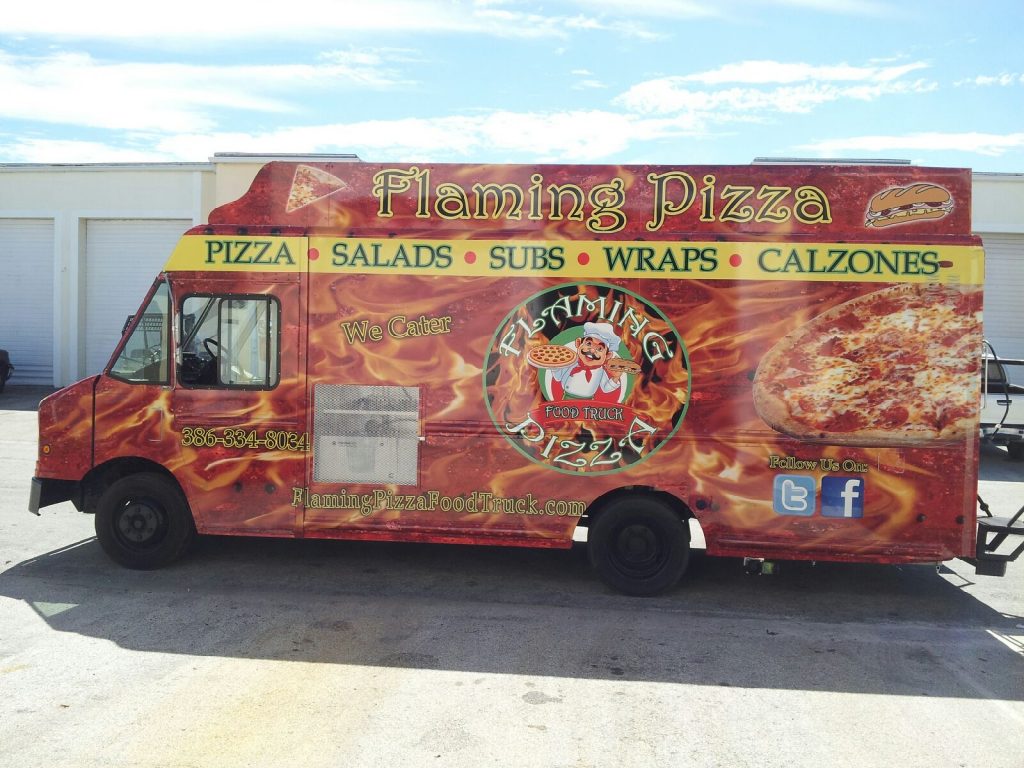Know the rules before you start your food truck business in Los Angeles
In this regulation article we’ll be covering the top 7 rules that ALL Los Angeles food truck owners must know if they are going to be running a food truck in Los Angeles. Please stay tuned to this series of articles for other cities as we publish them. The best way to stay in touch is to join our email list below in the red box.

Flaming Pizza Food Truck Built by M&R Specialty Trailers and Trucks.
1. Street Signs
“Signs, Signs, Everywhere a Sign,” you know the song right? Los Angeles is just as bad as all of the other major cities and their is no special exceptions for food trucks, even despite Los Angeles having some of the most food truck friendly laws in the country.
You must obey the posted parking restrictions, including, but not limited to, restrictions on stopping, loading, and parking from either posted signs or painted curbs” [LAMC 80.73(b)2(B)]
2. Stick to the sidewalk
This seems like a no-brainer but apparently there have been food trucks who have tried to serve their food with the service window facing the street?! Happy they got the sale… sad their customer got ran over by an oncoming car! Don’t let this happen to your day and be sure to know the rules and serve your food with your service window facing the sidewalk.
You must dispense food from the sidewalk side of the street. No truck may dispense food street side” [LAMC 80.73(b)2(C)]
3. Trash (part 1)
You must have a trash can outside your food truck and it needs to be clearly marked as a trash can and have a sign attached that requests customers to dump their trash in the receptacle. Having a trash can inside of the truck wont cut the mustard! We recommend this solid, 50-gallon trash can with easy rolling wheels for easy movement.
You must have a CONSPICUOUS litter receptacle which is clearly marked with a sign requesting its use by patrons [LAMC 80.73(b)2(D)]
4. Trash (part 2)
In addition to having a clearly marked trash can, you actually have to remove it and take it with you when you’re done serving food. Imagine that. Oh, and no cigarette butts either. So make sure you buy a well-constructed trash can with wheels on it for easy pick up after your long day.
Trash shall be removed from all areas VISIBLE around the truck. The truck shall take all bags with them when vacating an area. Trash is to include all materials originally dispensed from the truck as well as any other items left by patrons, such as cigarette butts [LAMC 80.73(b)2(E)]
5. Watch your head
Well, you don’t want to knock your customers out before you sell them some food right? So make sure you got the clearance man! Most food trucks should have the 7′ clearance you need, but best to consult with a licensed food truck builder just in case.
The “hatch” of a truck shall be at least 7 feet above the sidewalk in order to avoid patron collisions [LAMC 56.08(e) disputed]
6. Overnight
Food trucks must be parked overnight in a commissary which is basically a huge commercial kitchen with some parking spaces in or around it. Each major city has one or two of them and they typically charge food truck owners for a wide range of services. NO…the owner cannot park his “Bad Ass Burger” truck in his driveway after he’s done for the day. Why? Because it might explode as we have seen and reported on many, many, times.
Trucks must be parked at a Commissary every night. [Cal Code: 114295(c)]
7. Bathroom, please?
You know that sign in restaurant bathrooms instructing all employees to wash their hands before they return for work? Yeah, turns out the same thing applies to food truck employees, but instead of the city trusting them to do it on their truck….they require a public/private bathroom to be available within 200 feet of the truck while serving for over an hour. The letter isn’t needed any longer.
Trucks must have a bathroom letter from an accessible bathroom with hot water (103-108 degrees), single serving soap, paper towels, kept in clean working order if vending for over an hour (Cal Code: 114315)
Here is an epic checklist you can share with your fellow food truckers if you operate in Los Angeles! Note that every city and state you plan to operate in will have different laws. Generally speaking, larger cities will have more specific rules and regulations than smaller jurisdictions. Just remember that these laws were not put in place to be a nuisance to vendors. They were implemented to help keep the public safe, which is the goal of any reputation food truck owner as well.
